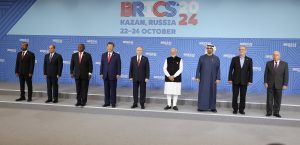There has been considerable media attention surrounding the participation of over 30 nations at this year’s BRICS Summit. Given that the summit was hosted by Russia in Kazan, some interpreted the robust participation as a sign of sustained support for Moscow from the developing world. However, this development should not be surprising. With its alternative global governance model, the BRICS’ offerings are delectable to many tired of the same servings.
We are seeing a dichotomy unfold in international relations, where the perception of Russia as a responsible global player is being decoupled from its identity as an aggressor. A distinction is being made between the politics of war and the politics of peace. Although we have done this for decades in the context of the United States, it has never been done quite so overtly.
If we look at the countries attending the summit, we shouldn’t be surprised; their motivations are understandable. Indonesia, Malaysia, Thailand, and Vietnam are all ASEAN members with close economic and cultural ties to China. Turkiye’s President Recep Tayyip Erdoğan attended, as it seeks to carve more space for autonomy of action. It is worth repeating that Turkiye is a NATO member. Given the United States’ support for Israel, the president of Palestine also attended to garner greater support amid the war in Gaza.
Further, Bangladesh and Sri Lanka’s participation was driven by potential access to alternative financing options, such as the BRICS-led New Development Bank (NDB), as opposed to traditional institutions like the International Monetary Fund (IMF). The BRICS’ agenda of de-dollarization deeply resonates with Venezuela, which has faced U.S. sanctions and seeks to conduct oil transactions outside the U.S.-dominated financial system.
In an unusual occurrence, both Armenia and Azerbaijan attended despite their ongoing territorial dispute. Azerbaijan applied for formal BRICS membership earlier this year, while Armenia, present for the first time, aimed to draw foreign investment to support its economy.
It is evident that ideological politics is not on the agenda for these states, but economics is. The BRICS nations want to push back against the West for using financial systems as political leverage. Even though India is not very keen on dismantling the current financial architecture, the bloc has expressed its intent to reduce its dependency on the U.S. dollar by promoting trade in local currencies. For instance, India and Russia have increasingly turned to the Indian rupee and Russian ruble for bilateral trade. Even though the BRICS Pay is far from fruition, there remains a desire to blunt the geoeconomic power of the West.
Another example of pragmatism was evident in the remarks of Indian Prime Minister Narendra Modi, terming the BRICS a “public interest group.” These countries recognize that there is a large segment of the global population that remains neutral to political divisions and is more concerned about issues that directly impact them on a day-to-day basis, such as health, food and the climate crisis. These areas are a major focus for the grouping.
For instance, in 2022, BRICS established a vaccine R&D center to enhance cooperation in biotechnology and pharmaceuticals. It has also committed to increasing the share of renewables in its energy mix with joint projects in clean energy technology and infrastructure. With the inclusion of six new oil-producing countries, BRICS+ will further emphasize energy trade and cooperation.
The Kazan Declaration’s acknowledgement of the Conference of the Parties (COP) sessions as the “primary and legitimate international forum to discuss the issue of climate change in all its dimensions” is a clear endorsement by the BRICS of the platform’s central role in global climate action.
It is noteworthy that the last two COPs were hosted by new BRICS entrants, Egypt in 2022 and the UAE in 2023, culminating in the establishment of the Loss and Damage Fund and the UAE Consensus. Further, with Brazil set to host it in 2025 and India vying for COP33 in 2028, it demonstrates that the climate issue is at the forefront of the BRICS agenda.
A concurrent consequence of the climate crisis is the long-term impact on agriculture and food systems. As some of the world’s largest agricultural producers, BRICS countries collectively account for around one-third of global food output. At this year’s summit, members committed to establishing a grain trading platform, the “BRICS Grain Exchange” proposed by Russia, which aims to support food and commodity trade within the bloc.
In 2023, China pledged emergency food assistance to African nations, particularly those affected by food inflation surges since the Russian invasion of Ukraine in 2022. Looking forward to the upcoming Global Food Security Summit 2024, which will be held in Abu Dhabi next month, the declaration emphasizes resilient supply chains, sustainable agricultural practices, and equitable trade policies.
Hence, the participation of all these nations in the Russia-hosted BRICS Summit should not be interpreted as an endorsement of war or violence. Instead, what brings them to the table is the realization that power, like wealth, is still thoroughly unequally distributed, and it is an imbalance that needs continuous correction.

































